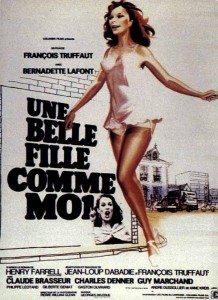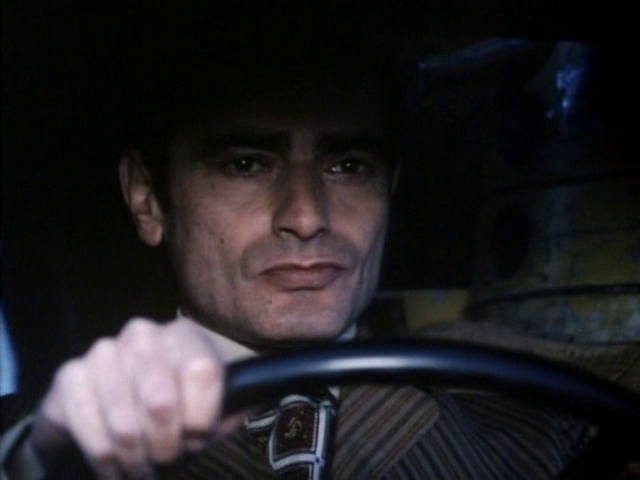|

Synopsis:
A sociology student (Andre Dussollier) writing his thesis on criminal women interviews a beautiful inmate named Camille (Bernadette Lafont) who has been jailed for murder. While listening to her recount her story, he finds himself deeply smitten with her, and dedicated to proving her innocence — but is she worthy of his adoration and trust?
|
|
Genres, Themes, Actors, and Directors:
- Black Comedy
- Femmes Fatales
- Flashback Films
- Francois Truffaut Films
- French Films
- Prisoners
Review:
Critical opinion seems fairly unanimous on this adaptation (by Francois Truffaut) of Henry Farrell‘s 1967 novel, with Time Out’s reviewer referring to it as “loud and crude”, and accurately naming it “Truffaut’s weakest movie, a black comedy which totally misfires”. Neither of the leads — either Dussollier’s hopelessly naive sociology student or Lafont’s calculating femme fatale — are anything close to likable, leaving us with nobody to root for and little interest in hearing Lafont relate her supposedly tragic background to Dussollier. Because it’s made clear to us from the beginning that Lafont is either lying and/or enormously deceptive, there is little point to learning more about her travails; we know that Dussollier is a dope for getting roped in, and we can see that he has nowhere to go but down. It’s especially disappointing to see Lafont — so appealing in her debut as the put-upon Marie in A Very Curious Girl (1969) — reduced to playing a comical tramp here. Charles Denner — star of Chabrol’s Bluebeard (1963) and Truffaut’s The Man Who Loved Women (1977) — gives the only semi-dignified performance in the film, playing an exterminator smitten with (and prey to) Lafont’s dubious charms.
Redeeming Qualities and Moments:
- Charles Denner as Arthur

Must See?
No; definitely feel free to skip this one. Not even recommended for Truffaut fans.
Links:
|
One thought on “Such a Gorgeous Kid Like Me (1972)”
First viewing. Clearly I take the opposite view here; a once-must – as one of Truffaut’s best films. As per my post in ‘Revival House of Camp & Cult’ (fb):
“Has it never occurred to you that she’s just a tramp?”
‘Such A Gorgeous Kid Like Me’: I’m very tough on the work of Francois Truffaut. He made a whole lot of shitty movies. The bulk of his output consists of snob-appeal art films superficially about love (more accurately about bad or, at any rate, uninteresting relationships). He also often cast Jean-Pierre Léaud, one of the worst actors in cinema history, so that never helped.
Occasionally, Truffaut hit a more-commendable target (‘Jules and Jim’, ‘The Wild Child’, ‘The Story of Adele H.’). He even once successfully challenged himself in making something far removed from his comfort zone: sci-fi (‘Fahrenheit 451’). He also did one thing that makes me rather proud of him, now that I’ve finally seen it: this film.
‘Gorgeous Kid’ is an engaging black comedy about the ultimate charming femme fatale; a rather zany woman named Camille Bliss (what a name!) who is brought to hilarious life by the high-spirited Bernadette Lafont. Frankly, I can’t think of another French actress who could have pulled off what Lafont effortlessly manages as Camille. She plays the part as though she’s more whimsical than amoral; like you couldn’t be mad at her for any reason because she believes that taking advantage is always a game of two-to-tango (so nothing is particularly her fault).
In the film, an imprisoned Camille is being interviewed by a young sociologist doing a thesis on female killers. True to form, Camille takes the opportunity to reinvent herself sympathetically.
Truffaut based his movie on a novel by Henry Farrell, author of ‘What Ever Happened to Baby Jane?’ and ‘Hush… Hush, Sweet Charlotte’, etc. and one can sense the original author’s unique idiosyncratic touch throughout. Truffaut adapted the story with Jean-Loup Dabadie (the only time the two collaborated). Anyone familiar with Truffaut films should sense that Dabadie (a more seasoned comic writer) must have had the upper hand; Truffaut isn’t normally anywhere near this funny.
Certain films are often called “underrated” but, here, I think the term really does apply. It seems that it was largely dismissed by critics who couldn’t shift their thinking about Truffaut in order to entertain the idea that he might have made a real comedy.
But he did. Once.